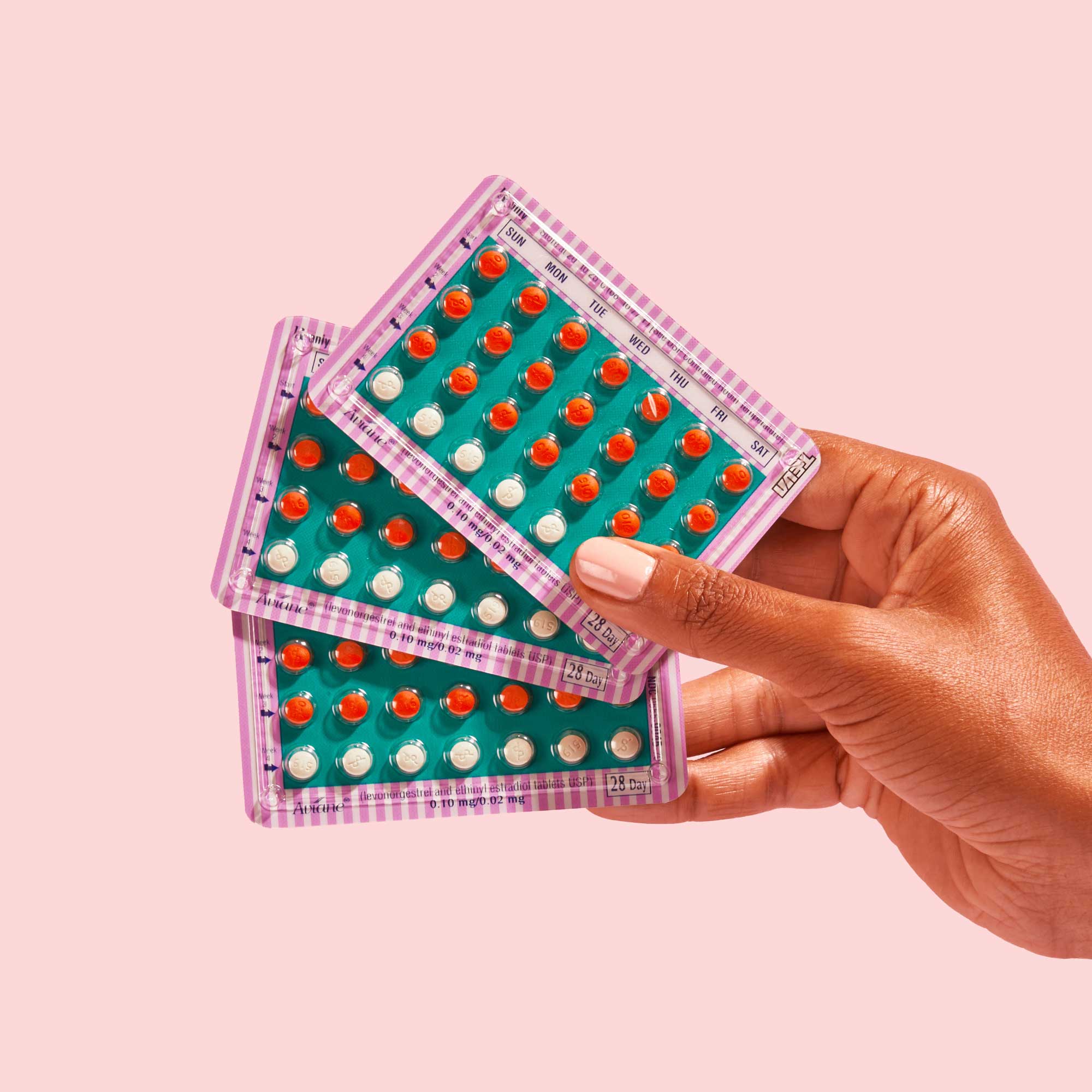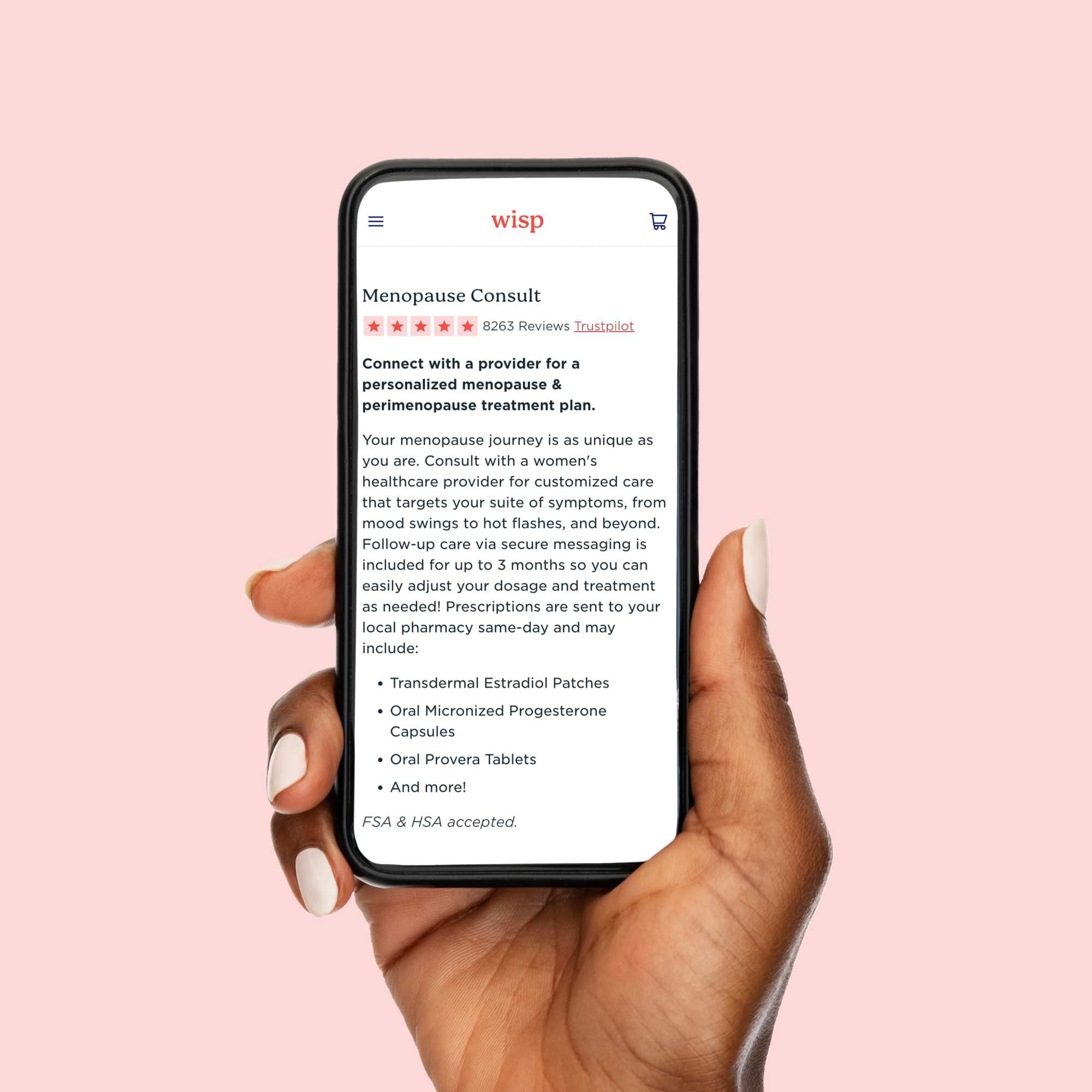
Written by Kathleen Morrison
Medically Reviewed by Andrea Sleeth WHNP-BC, MSCP
Ever find yourself wide awake at 2 a.m., mind racing, body exhausted, and no clue why you just can’t drift off? If your sleep struggles seem to sync up with your cycle, pregnancy, menopause, or any other hormonal shifts, you might be dealing with something called hormonal insomnia. And yes—it’s real.
Hormones play a huge role in how our bodies regulate sleep, so when they rise and fall (like during PMS, postpartum, or menopause), it can totally throw off your rest. The result? Nights of tossing and turning, paired with groggy, not-so-great mornings.
Getting to know more about the hormone-sleep connection is the first step to taking charge of your rest, and we’ve got you covered with approachable, practical ways to start feeling more like yourself.
Signs your hormones might be causing your sleep problems
When your hormones are out of sync, your sleep can feel out of whack, too. The clues are usually pretty obvious once you know what to look for, and spotting them is the first step toward getting your rest back on track.
Trouble falling (and staying) asleep
Lying awake while the rest of the world is snoozing? Been there. When stress hormones like cortisol stay revved up at night, or when progesterone dips during certain points in your cycle, your body feels wired instead of relaxed. No amount of “just chill” advice is going to cut it.
Night sweats and hot flashes
Nothing kills a good night’s sleep like waking up drenched. If you’re in perimenopause or menopause, those heat waves and night sweats are often your hormones shifting gears. It’s not just uncomfortable, it’s exhausting when it happens night after night.
Middle-of-the-night wakeups
You fall asleep fine, but suddenly snap awake at 2 a.m.? Hormonal shifts (especially low estrogen or dips in blood sugar tied to insulin) can jolt you out of rest. Once you’re awake, it’s often tough to settle back down.
Restless legs or muscle cramps
That creepy-crawly feeling in your legs or sudden calf cramps can sometimes be linked to hormonal imbalances that affect magnesium or calcium levels. Even if you’re exhausted, your body won’t stop fidgeting long enough to rest.
Which hormones can affect sleep?
Think of your hormones as the backstage crew for your body’s nightly performance. When they’re working in harmony, the show (aka: your sleep) goes off without a hitch. But when your hormone levels are out of tune? Suddenly, you’re tossing, turning, and wondering why the middle of the night has become your new wake-up call.
Melatonin and cortisol
Melatonin is basically your body’s “time to snooze” signal. It rises when the lights go down and nudges you toward dreamland. But here’s the catch: if other hormones (looking at you, cortisol) are running the show, melatonin doesn’t get the spotlight it deserves.
Too much cortisol (the stress hormone) can dim melatonin’s glow and keep you wired when you should be winding down: sleep disturbances galore.
Estrogen and progesterone
Estrogen and progesterone are actually a best friend duo for good sleep. Estrogen helps regulate your body temperature and supports deep sleep and restorative rest. Progesterone? It’s got a natural calming vibe that can help you drift off more easily.
When these two dip or swing—whether it’s during your cycle, pregnancy, or menopause—you might notice:
- Hot flashes or night sweats
- Mood swings that make it tough to relax
- Restless nights with that “tired but wired” feeling
Your sleep issues aren’t “all in your head.” They’re often connected to very real hormonal shifts. And once you know what’s up, you can take steps (with a little professional guidance) to get your insomnia symptoms under control and your nights back on track.
Hormone triggers that can wreck your sleep
While your body does its best to keep things balanced, there are certain times in life when those hormones go off script... And your sleep pays the price. Let’s talk about a few of the most common culprits.
Menopause and perimenopause
If you’re in your 40s and 50s and wondering why decent sleep quality suddenly feels like a distant memory, you're definitely not alone. Perimenopause and menopause are like the wild west for your hormones—especially estrogen and progesterone. These levels don’t just drop; they bounce around like crazy, and your body’s like, “what even is bedtime anymore?”
Common sleep disruptor menopausal symptoms in this stage include:
- Hot flashes and night sweats (aka: middle-of-the-night wardrobe changes)
- Mood swings and anxiety that show up just when you’re trying to chill
- Insomnia that comes and goes, even when you’re totally wiped
If this sounds like you, you could look into: birth control options for hormonal balance, or menopause consults so someone can listen to your symptoms and help stabilize things—so you can finally get some rest.
Wisp treatment options are available only after consultation with a licensed medical professional. You should consult with your healthcare provider before starting a new supplement or treatment regimen. Individual results may vary.
Menstrual cycle shifts
Even if you’re nowhere near menopause, your monthly cycle can still mess with your body and cause poor sleep. The days leading up to your period (a.k.a. the luteal phase) are often especially rough. That’s when progesterone rises, then drops suddenly, and that hormonal dip can leave your body feeling restless, bloated, and irritable right when you want to sleep.
Sound familiar? You might notice:
- PMS-related insomnia (ye, it’s a thing)
- Cramps, bloating, and mood swings that make it hard to wind down
- Random wakeups or trouble staying asleep even when you’re exhausted
The good news: once you start paying attention to these patterns, it gets way easier to work with your body instead of feeling like you’re fighting it every night.
Sleep hygiene tips
When your hormones are acting up, little tweaks can make a big difference. Think of these as your healthy hormone hacks for a better night’s rest:
Stick to a consistent sleep schedule:
- Go to bed and wake up at roughly the same time every day, even on weekends.
- Pair it with a wind-down routine: dim the lights, do gentle stretches, or take a warm shower to tell your body it’s time to sleep.
Keep your bedroom cool and dark:
- Aim for 60–67°F to help your body naturally drift into sleep mode, especially if night sweats are a thing.
- Block light with blackout curtains or an eye mask; cover LED lights that sneak in.
Limit screens before bed:
- Phones, tablets, and laptops emit blue light that tricks your brain into thinking it’s daytime.
- Try a “tech curfew” 30–60 minutes before bed or use blue-light filters if you can’t resist scrolling.
Get morning sunlight:
- Exposing yourself to natural light first thing helps regulate your circadian rhythm and signals your body when it’s time to be awake versus asleep.
Mind your evening habits:
- Heavy meals or lots of liquids right before bed can disrupt sleep.
- Instead, opt for a light snack if you’re hungry and stay hydrated throughout the day rather than cramming fluids at night.
Create a calming bedtime ritual:
- Think reading, journaling, meditation, or gentle yoga.
- Even 10–15 minutes of quiet, soothing activities can cue your body for rest.
Use your bedroom for sleep only:
- Keep work, stress, and social media out of your sleep space so your brain associates the room with rest, not stimulation.
How to help your sleep issues
Sometimes your bedtime routine isn’t enough, and that’s totally okay. There are plenty of ways to help give your sleep a boost and get those zzz's back on track.
Melatonin supplements
Think of melatonin as your body’s “sleep signal.” A little extra can help reset your rhythm. Start small, around 0.5–3mg, 1–2 hours before bed.
Timing is key: too early or too late, and it might confuse your body. Today, it's easy to get supplements and expert advice online, so you don’t even have to leave the couch.
Relaxation exercises
Hormones and stress love to gang up on you at night. Combat the chaos with progressive muscle relaxation, deep breathing (hello, 4-7-8 technique), or 5–10 minutes of meditation to quiet that racing mind. Even just a few minutes can make bedtime feel way more chill.
Herbal helpers
Want a little extra cozy ritual? Chamomile tea, lavender, or valerian root can help your brain and body get the hint that it’s time to snooze. Bonus points if you make it a bedtime mini-ceremony.
Keep a steady routine
Your body loves rhythm. Going to bed and waking up around the same time every day—even weekends—trains your sleep hormones to play nice. Add a little ritual, like journaling, soft music, or a warm bath, to signal “sleep time.”
Know when to call in backup
If you’ve been trying everything and still can’t get the shut-eye you need, it might be time to bring in reinforcements. Chronic insomnia (or other sleep disorders, like sleep apnea) lasting more than three months, or sleep issues that line up with your cycle, night sweats, or mood swings?
Yep, that’s a hint to get a pro involved. You might need to look into solutions like hormone replacement therapy (HRT), sleep aids, or something else tailored to your unique struggles.
Don't let your hormones run the show
Hormonal insomnia can feel like your body is playing tricks on you, but understanding how hormones and sleep interact gives you the upper hand. From monthly cycles to perimenopause and beyond, knowing the signs can help you figure out when your hormones are hijacking your nights.
Small, practical changes, like keeping a steady sleep schedule or dialing in a cool, dark bedroom, can make a noticeable difference. And when life (or your hormones) still keeps you tossing and turning, Wisp has your back with supplements, support, and online consultations to get personalized guidance, all from the comfort of home.
Sleep isn’t a luxury. It’s your foundation for feeling good, thinking clearly, and living your best life. Ready to give your body the support it deserves? Explore Wisp today!
This blog post is for informational and educational purposes only and should not be taken as professional advice. Always consult with a qualified professional before making any decisions based on the information provided here.




